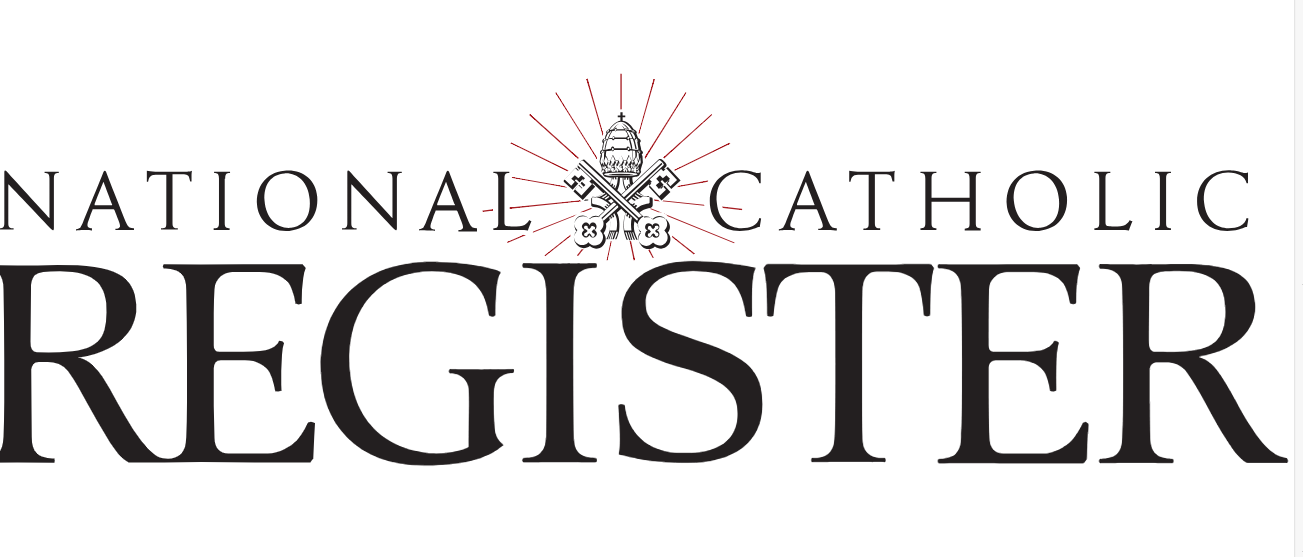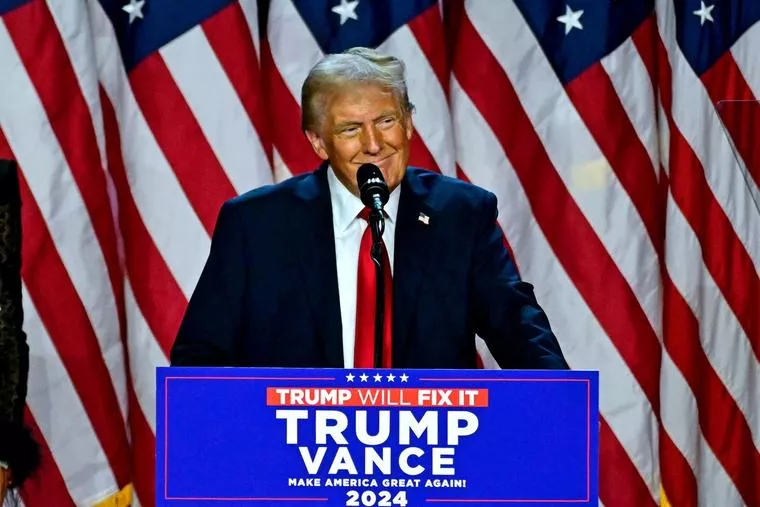President-elect Donald Trump speaks during an election-night event at the West Palm Beach Convention Center in West Palm Beach, Florida, on Nov. 6, 2024. (photo: JIM WATSON/AFP via Getty Images)

ANALYSIS: Impressive gains among Latino and Black voters, coupled with a strong showing among Catholics, helped propel Donald Trump to a historic victory.
In a political comeback for the ages, Republican Donald Trump on Nov. 5 became the first president since Grover Cleveland to win a second non-consecutive term in the White House.
Securing at least 292 electoral votes, well over the 270 needed to win, with votes in a handful of states still being counted as of Wednesday afternoon, Trump’s decisive victory caps an unprecedented election season in which the brash businessman overcame multiple indictments, two assassination attempts and two general election opponents, President Joe Biden and his successor at the top of the Democratic ticket, Vice President Kamala Harris.
Trump’s stunning victory signaled a demographic realignment in U.S. politics. The move includes several meaningful shifts in the electorate toward the Republican Party, including among Latino, Black and Catholic voters, the latter of which favored Trump by a decisive margin.
Men without a college degree who are concerned with the economy and the border powered the swing toward Trump in each of these demographics, causing many to credit Trump’s outreach strategy toward these groups through appearances on male-driven podcasts and at blue- collar venues. The Harris campaign, on the other hand, is facing criticism for focusing too heavily on abortion, celebrity endorsements and the supposed “threat to democracy” caused by Trump.
“This is a historic disaster of biblical proportions,” Chris Kofinis, a Democratic strategist, told The Wall Street Journal in the wake of the election. “The Democratic Party, as it is, is dead. This is a historic realignment. There were Reagan Democrats. Now there are Trump Democrats.”
The Latino Vote
The shift in voter preference was most pronounced among Latinos. According to NBC News exit polling, Trump’s share of the overall Latino vote rose to 45%, up 13 points from his showing in the 2020 election. For the Democratic ticket, the data is even starker. According to CNN, Biden won the Latino vote in 2020 by 41 points. This time around, Harris won the Latino vote by only four points.
A look inside the numbers reveals a remarkable rise with Latino voters for a politician who appeared on the political scene nearly a decade ago railing about the evils of illegal immigration and vowing to build a wall across the porous southern border.
In this election, Latinos favored Trump outright on the issue of immigration, for instance, and Latino men favored Trump by a 10-point margin. In the crucial swing state of Michigan, Latino males favored Trump by a whopping 25 points.
“It is no surprise that Latinos turned out in waves to elect President Donald Trump in this election,” Melvin Soto, a Republican media strategist, told the Register. “They backed the candidate who supported our families, secured our communities and gave Latinos the lowest unemployment rate and highest incomes in history. Most importantly, they backed the candidate who was fearful of God and did not tell them they were not welcome because of their faith. This election signifies a historic shift to a party that truly represents them, ending their adherence to the Democrats.”
Catholic voters also played a decisive role in this election by swinging heavily toward Trump.
In 2020, Catholics split evenly between Trump and Biden, the second Catholic president in U.S. history. But Catholic voters broke for Trump on Tuesday, favoring the Republican candidate 56%-41%, according to NBC News.
In Michigan, where Democratic Gov. Gretchen Whitmer found herself in hot water with Catholic voters for making a video that appeared to mock the Eucharist, white Catholics voters broke overwhelmingly for Trump on Election Day, preferring him to Harris by a 20-point margin.
Catholic voters also streamed to Trump in the other major swing states. In recent weeks, the GOP ticket made a focused and compelling outreach effort to Catholic voters in the Midwest and Sun Belt battleground states, which included smartly executed warnings about Harris’ poor record on religious freedom and campaign ads featuring campaign surrogate Robert F. Kennedy Jr.’s reflections on Catholicism.
Meanwhile, the Harris campaign suffered one misstep after the next with Catholic voters. In addition to Whitmer’s bizarre video, Harris refused to consider religious exemptions for abortion in a major network television interview and skipped a personal appearance at the Al Smith Dinner hosted by New York Cardinal Timothy Dolan, which proved to be a crucial missed opportunity to reach Catholic voters. She instead sent remarks via video.
In response to Harris’ decision to decline her invitation to the dinner, Cardinal Dolan ominously remarked that the only other major party nominee to skip the event was Walter Mondale in 1984.
“And remember, he lost 49 out of 50 states,” he wryly told the media.
Whatever the cause, Catholic voters rewarded Trump with overwhelming majorities in the battlegrounds. In North Carolina, Pennsylvania and Wisconsin, Catholic voters chose Trump over Harris by 17, 14 and 16 points, respectively. And in Florida, which Democrats hoped to compete in this race, Catholic voters went for Trump by a 29-point margin.
“Catholic voters played a decisive role in the historic victory of Donald Trump and J.D. Vance,” read a statement from Catholic Vote, a lobbying organization. “These numbers are shocking and could prove to be the largest margin among Catholics in a presidential race in decades. Catholics proved again to be a critical voting bloc that cannot be ignored.”
For Mary Rice Hasson, a senior fellow at the Ethics and Public Policy Center, Harris’ decision to emphasize abortion rights damaged her chances with Catholic voters.
“Harris made it a linchpin of her campaign,” she said during EWTN News’ election analysis special Wednesday morning. “I think that just don’t sit well with Catholics.”
The Black Vote
Shifts in the Black vote also proved decisive in Trump’s victory. Despite running as the first Black woman nominee in U.S. history, Harris significantly underperformed with Black voters in relation to previous Democratic nominees.
According to exit polling from The Associated Press, Harris won 80% of the Black vote, which was down from Biden’s total of 90% in 2020. Meanwhile, Trump carried 20% of the Black vote, which is the highest total for a Republican nominee since the days of Richard Nixon. The Black voter shift toward Trump was most pronounced in the swing states of Wisconsin and Nevada, where Democrats were disappointed by low turnout in counties that traditionally vote heavily in their favor.
As with all the demographic shifts this election, the Black voter swing toward Trump was driven by men. Nationally, 24% of Black men voted for the Republican nominee, a number that was mirrored in the crucial swing state of Georgia, in which Trump won a full quarter of the Black male vote.
The Democratic ticket began a major outreach effort toward Black men in mid-October, unveiling a plan that would offer forgivable loans of up to $20,000 to Black entrepreneurs and showing support for federal marijuana legislation. Former President Barack Obama was also tapped to reach out to Black male voters.
Speaking at a campaign event for Black men in Pittsburgh, Obama lamented that a lack of enthusiasm for Harris was “more pronounced with the brothers.” The comments were widely criticized by prominent Black voices in the media, including CNN analyst Nina Turner, who said the comments “belittled” Black men. Popular Black actor Wendell Pierce described it as an “awful message,” saying, “The party has to stop scapegoating Black men. Black men aren’t the problem.”
As Trump’s victory became more likely Tuesday night, Fox News anchor Lawrence Jones III, who is Black, posted on X, formerly Twitter, “Never tell Black men what to do.”
As of Wednesday afternoon, Trump will enjoy at least a 52-seat majority in the Senate, with a few races yet to be called. The race for the House of Representatives remains uncalled and appears likely to go down to the wire. At last count, Republicans held a 200-183 margin, with 218 being a majority.
 Peter Laffin Peter Laffin is a staff writer for the National Catholic Register and a contributor at the Washington Examiner. His work has appeared in The Catholic Herald, The Catholic Thing, and RealClearPolitics
Peter Laffin Peter Laffin is a staff writer for the National Catholic Register and a contributor at the Washington Examiner. His work has appeared in The Catholic Herald, The Catholic Thing, and RealClearPolitics

